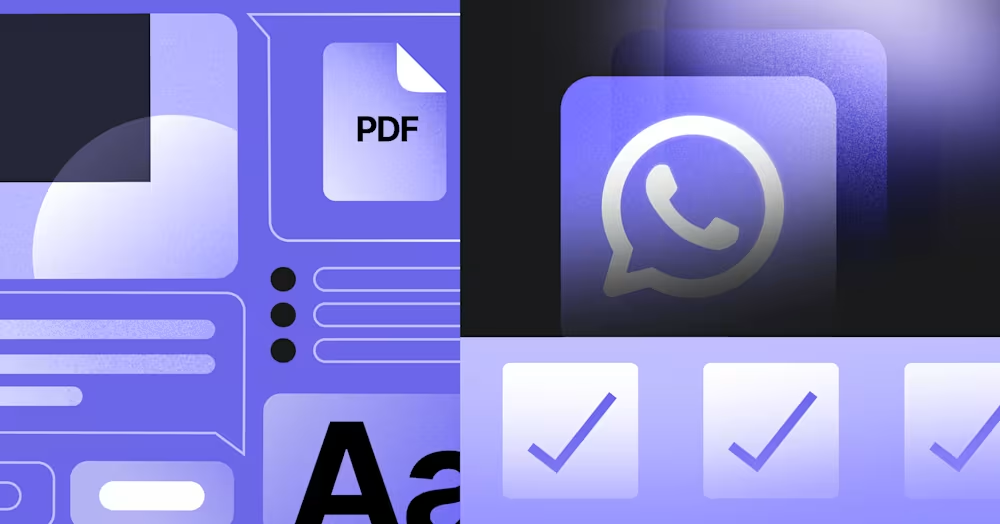
Template Pesan WhatsApp: Panduan Praktis dengan 13 Contoh
Bisnis tidak dapat mengirim pesan WhatsApp setelah 24 jam kecuali mereka menggunakan Templat Pesan WhatsApp. Pelajari cara memformat dan mengirim pesan templat beserta contohnya.
![WhatsApp Newsletter: Panduan untuk Newsletter WhatsApp Business [Nov 2023]](https://assets2-proxy.respond.io/ph8r57dk1q9w/5kVZPTaVPNMGgAuZzcAYMR/6d97139f6f3d3298a137aa261a11b54f/how-to-whatsapp-newsletter-cover_0ed7495fee688e6a6359c8813731fc9a.jpg?q=70&fm=avif)
Apakah Anda tertarik untuk menjangkau audiens Anda secara efektif melalui buletin? Jika pelanggan Anda ada di WhatsApp, menggunakan buletin bisnis WhatsApp adalah solusi ideal. Dalam artikel lengkap ini, kami akan membahas keuntungan menggunakan buletin WhatsApp untuk komunikasi dengan pelanggan. Selain itu, kami akan membimbing Anda melalui proses menggunakan alat buletin WhatsApp untuk mengirim buletin ke daftar kontak Anda dengan mudah.
Untuk membantu Anda lebih lanjut, kami akan menyediakan koleksi template berharga untuk menginspirasi dan membantu Anda menyusun buletin WhatsApp yang menarik. Mari kita selami dan buka potensi penuh buletin WhatsApp untuk membawa pemasaran WhatsApp Anda ke tingkat berikutnya.
Buletin WhatsApp adalah pesan massal yang dikirimkan kepada pelanggan melalui WhatsApp. Mereka memberikan cara langsung dan efektif bagi bisnis untuk berinteraksi dengan audiens mereka dan menjaga mereka tetap terinformasi tentang acara penting.
Buletin WhatsApp dapat mencakup berbagai jenis konten, seperti pembaruan tentang produk atau layanan baru, promosi, diskon, berita perusahaan, tips, atau informasi lain yang ingin dibagikan bisnis atau organisasi kepada pelanggan.
Mari kita lihat beberapa manfaat menggunakan WhatsApp untuk buletin.
Mengirim newsletter WhatsApp menawarkan beberapa keuntungan dibandingkan saluran komunikasi tradisional. Berikut adalah beberapa alasan utama mengapa bisnis harus mempertimbangkan untuk mengintegrasikan mereka ke dalam strategi komunikasi pelanggan mereka:
Tingkat pembukaan tinggi: Pesan WhatsApp memiliki tingkat pembukaan yang tinggi dibandingkan email, karena orang cenderung memeriksa pesan WhatsApp mereka lebih sering. Artinya, bisnis dapat menjangkau audiens yang lebih luas dengan pesan-pesan mereka.
Pemberitahuan yang dipersonalisasi: Newsletter WhatsApp dapat disesuaikan, memungkinkan bisnis untuk menyesuaikan pesan mereka kepada audiens tertentu dan meningkatkan relevansi serta efektivitas pesan mereka.
Konten multimedia dan interaktif: WhatsApp mendukung berbagai bentuk multimedia, termasuk gambar, video, dan dokumen. Hal ini memungkinkan bisnis membuat buletin yang menarik secara visual dan memikat perhatian pelanggan mereka. Selain itu, WhatsApp memungkinkan elemen interaktif seperti tombol dan balasan cepat, yang memungkinkan bisnis mengumpulkan umpan balik atau mendorong pelanggan untuk mengambil tindakan tertentu.
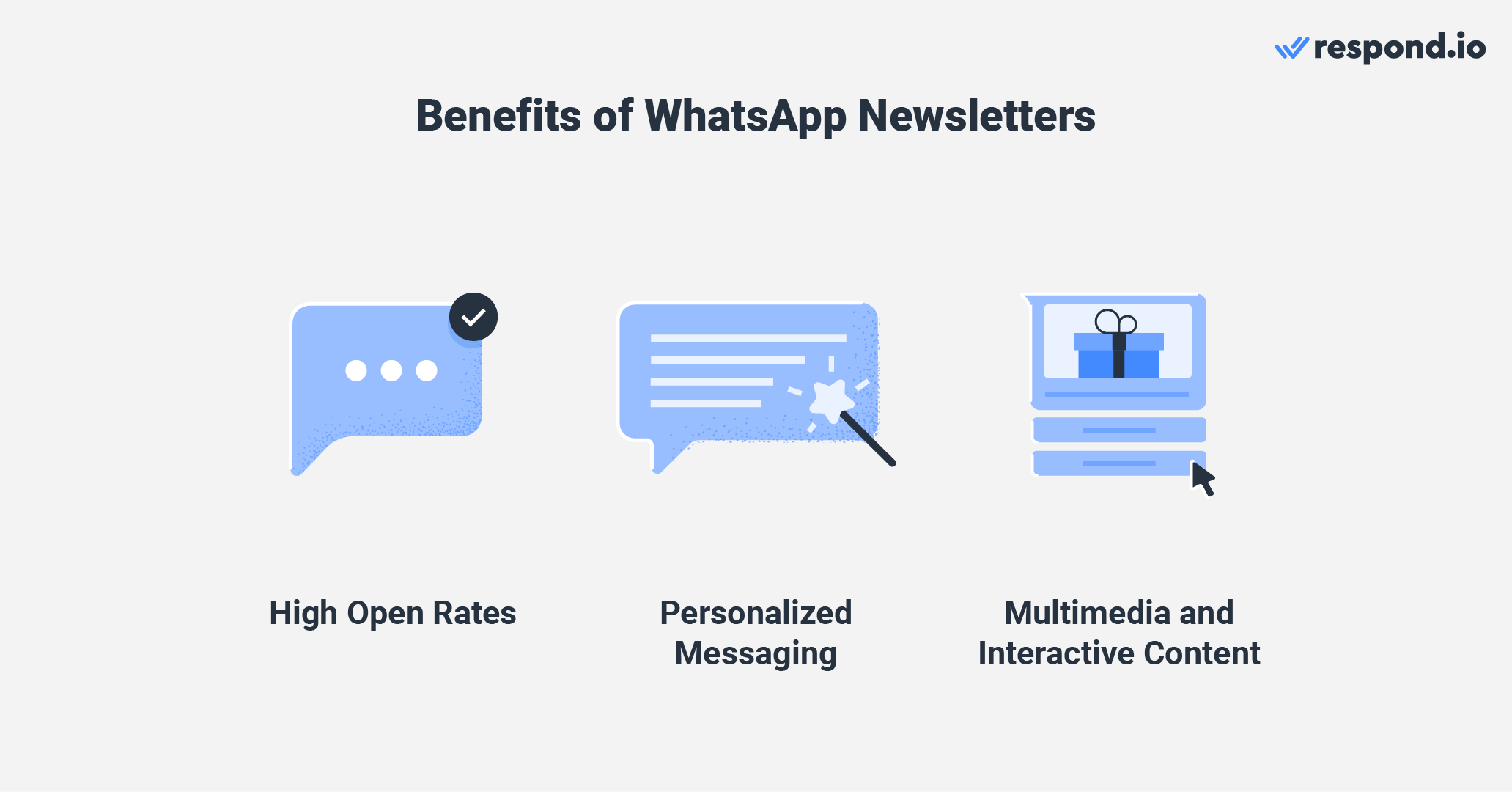
Sekarang setelah Anda mengenal beberapa manfaatnya, kami akan menjelaskan opsi yang tersedia untuk mengirim buletin WhatsApp.
Ubah percakapan menjadi pelanggan dengan API WhatsApp resmi respond.io. ✨
Kelola panggilan dan obrolan WhatsApp di satu tempat!
Mengirim buletin WhatsApp merupakan proses yang sederhana yang dapat dilakukan menggunakan Aplikasi WhatsApp Business atau API WhatsApp Business. Alat buletin WhatsApp pilihan Anda tergantung pada kebutuhan dan skala pesan Anda. Kami akan menjelajahi kedua opsi di bagian ini, dimulai dengan Aplikasi WhatsApp Business.
Jika Anda seorang pelaku bisnis kecil atau freelancer yang ingin mengirim buletin kepada audiens yang relatif kecil, Aplikasi WhatsApp Business menyediakan solusi yang ramah pengguna. Berikut adalah langkah demi langkah tentang cara mengirim buletin WhatsApp melalui aplikasi.
Buka Aplikasi WhatsApp Business.
Pilih layar Obrolan > Menu > Daftar Baru.
Ketiknama kontak yang ingin Anda kirimi pesan atau tekan tombol + untuk memilihnya langsung dari daftar kontak Anda.
TekanOK.
TekanBuat
Anda baru saja membuat daftar kontak baru. Untuk mengirim newsletter Anda ke audiens kustom ini, tekan tombol Menu > Labels dan pilih daftar kontak Anda. Kemudian, tekan tiga titik di sudut kanan atas dan pilih Kirim pesan ke pelanggan dari menu. Susun pesan Anda dan tekan tombol kirim saat selesai.
Aplikasi WhatsApp Business memiliki batas kontak maksimal sebesar 256 penerima untuk pengiriman massal. Ini berarti saat mengirim pesan kepada beberapa penerima sekaligus, Anda dapat menyertakan hingga 256 kontak dalam audiens target Anda untuk satu pesan atau buletin.
Jika Anda memiliki audiens yang jauh lebih besar atau memerlukan fitur yang lebih canggih, pertimbangkan untuk menggunakan WhatsApp Business API, yang menyediakan kemampuan skala tambahan dan fleksibilitas untuk mengirim pesan ke lebih banyak kontak.
Saat mengirim Newsletter API WhatsApp, sangat penting untuk memahami elemen kunci yang memastikan pengiriman pesan yang sukses dan kepatuhan terhadap Kebijakan dan Perdagangan WhatsApp.
Pertama, persetujuan adalah elemen penting dalam mengirim newsletter API WhatsApp. Semua pelanggan Anda harus telah memberikan persetujuan untuk menerima pesan dari Anda, karena pesan yang tidak diminta dapat mengakibatkan penalti atau penangguhan akun.
Juga, pastikan newsletter WhatsApp Anda mematuhi pedoman WhatsApp untuk memberikan informasi relevan kepada pelanggan Anda sambil menghindari spam.
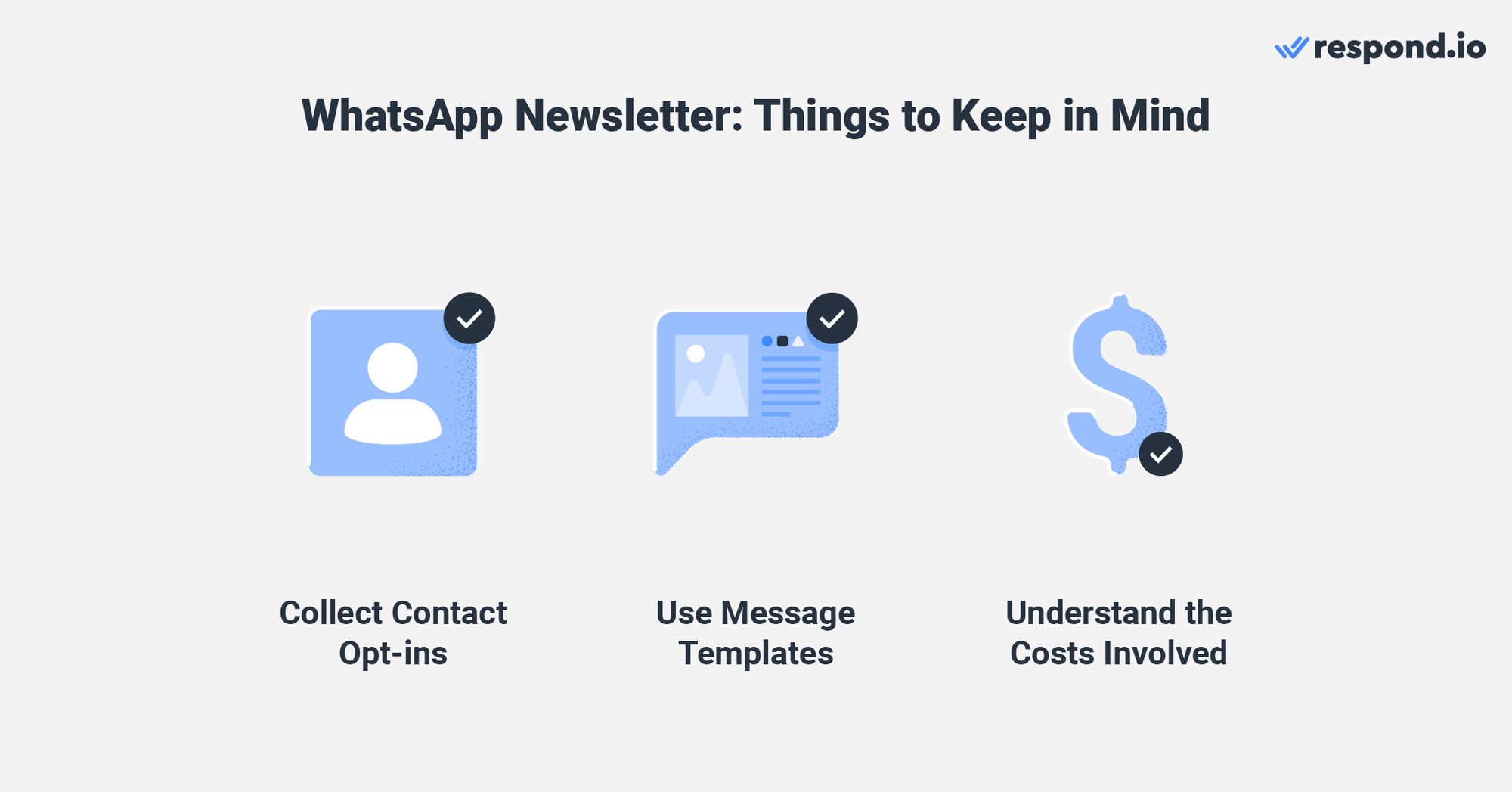
API WhatsApp Business membutuhkan penggunaan template pesan yang telah disetujui untuk pengiriman massal. Selain newsletter WhatsApp, Anda dapat membuat template untuk berbagai jenis pesan, seperti konfirmasi pesanan atau pembaruan pengiriman.
Terakhir, sangat penting bagi bisnis untuk memahami struktur harga WhatsApp Business API. Biaya dapat bervariasi tergantung pada negara tujuan pesan dan jenis percakapan. Selain itu, beberapa Penyedia Solusi WhatsApp Business membebankan markup per pesan yang dikirim.
Untuk memulai newsletter WhatsApp API pertama Anda, Anda perlu akun API WhatsApp dan kotak masuk pesan WhatsApp. Anda dapat mencoba respond.io secara gratis dan mendapatkan akun API WhatsApp dalam beberapa menit. Semua siap? Kemudian ikuti langkah-langkah berikut untuk menggunakan respond.io sebagai alat newsletter WhatsApp.
Sebelum mengirim newsletter bisnis WhatsApp, Anda perlu menentukan audiens yang akan menerimanya. Mulai dengan membuat segmen dari daftar kontak yang ada menggunakan filter atau mengimpor daftar kontak ke respond.io.
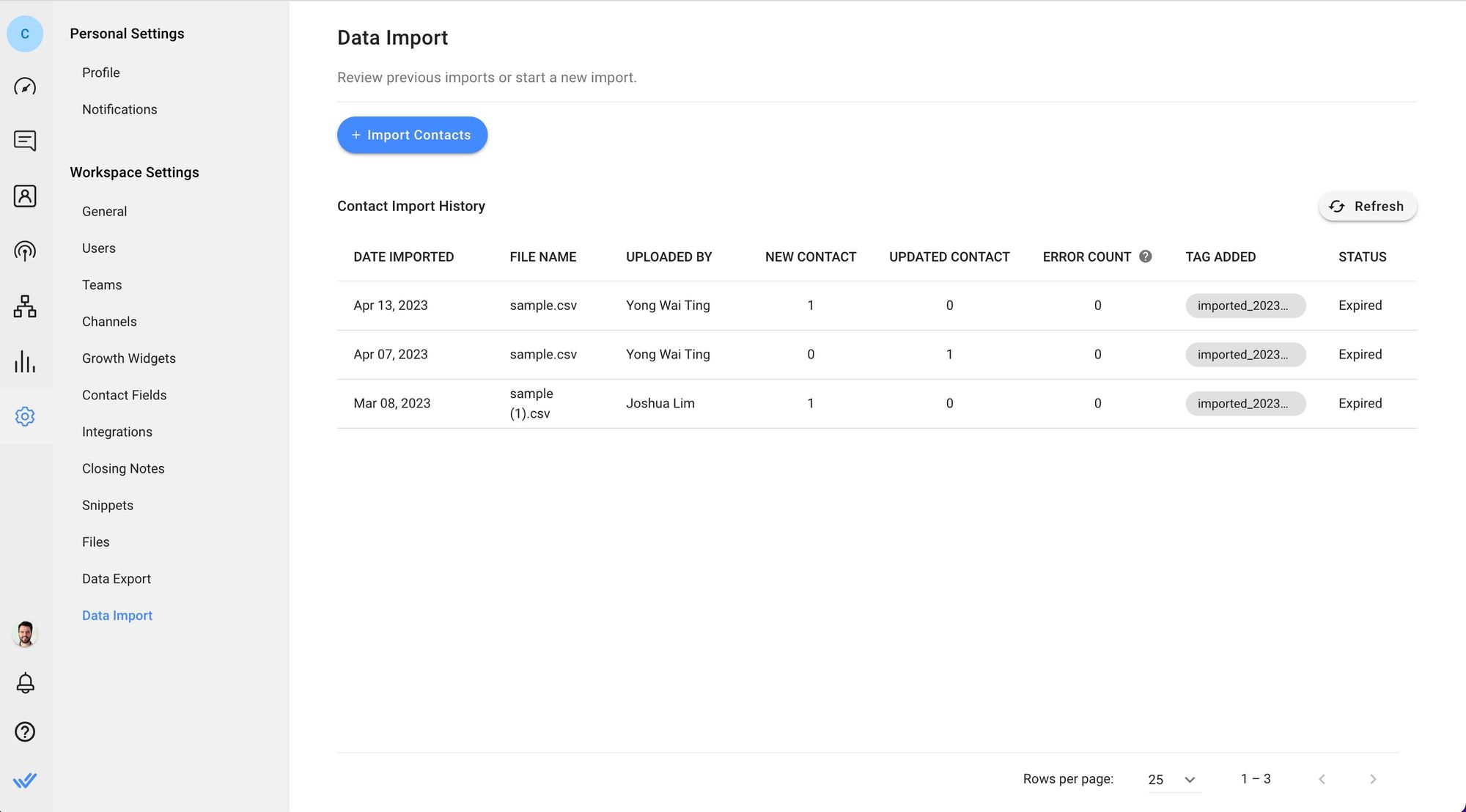
Apapun pilihan Anda, ingat bahwa Anda hanya boleh membuat segmen audiens dengan kontak yang telah memberi izin untuk menerima notifikasi dari bisnis Anda. Jika tidak, akun Anda berisiko ditangguhkan.
Setelah Anda membuat segmen siaran, Anda dapat melanjutkan untuk membuat template pesan WhatsApp.
Navigasikan ke Modul Pengaturan .. Dari sini, pilih Saluran dan pilih saluran API WhatsApp Anda. Di bawah bagian ini, klik Template untuk melanjutkan. Di dalam bagian Template, klik tombol Kirim Template untuk memulai.
Dalam formulir pembuatan templat, berikan rincian penting seperti nama templat, kategori, bahasa, dan isi templat Anda.
Berikan perhatian yang cermat pada kategori templat, karena memilih kategori yang salah dapat menjadi alasan penolakan. Meskipun buletin biasanya termasuk dalam kategori Pemasaran, disarankan untuk meninjau Pedoman Kategori WhatsApp sebelum mengirimkan templat Anda guna mencegah penolakan.
Untuk membuat buletin bisnis WhatsApp Anda menarik secara visual, pertimbangkan untuk menyertakan tajuk dalam bentuk teks, gambar, video, atau dokumen. Selain itu, Anda dapat menambahkan teks footer untuk memberikan informasi lebih lanjut atau merek. Langkah-langkah ini bersifat opsional tetapi dapat meningkatkan desain keseluruhan templat Anda.
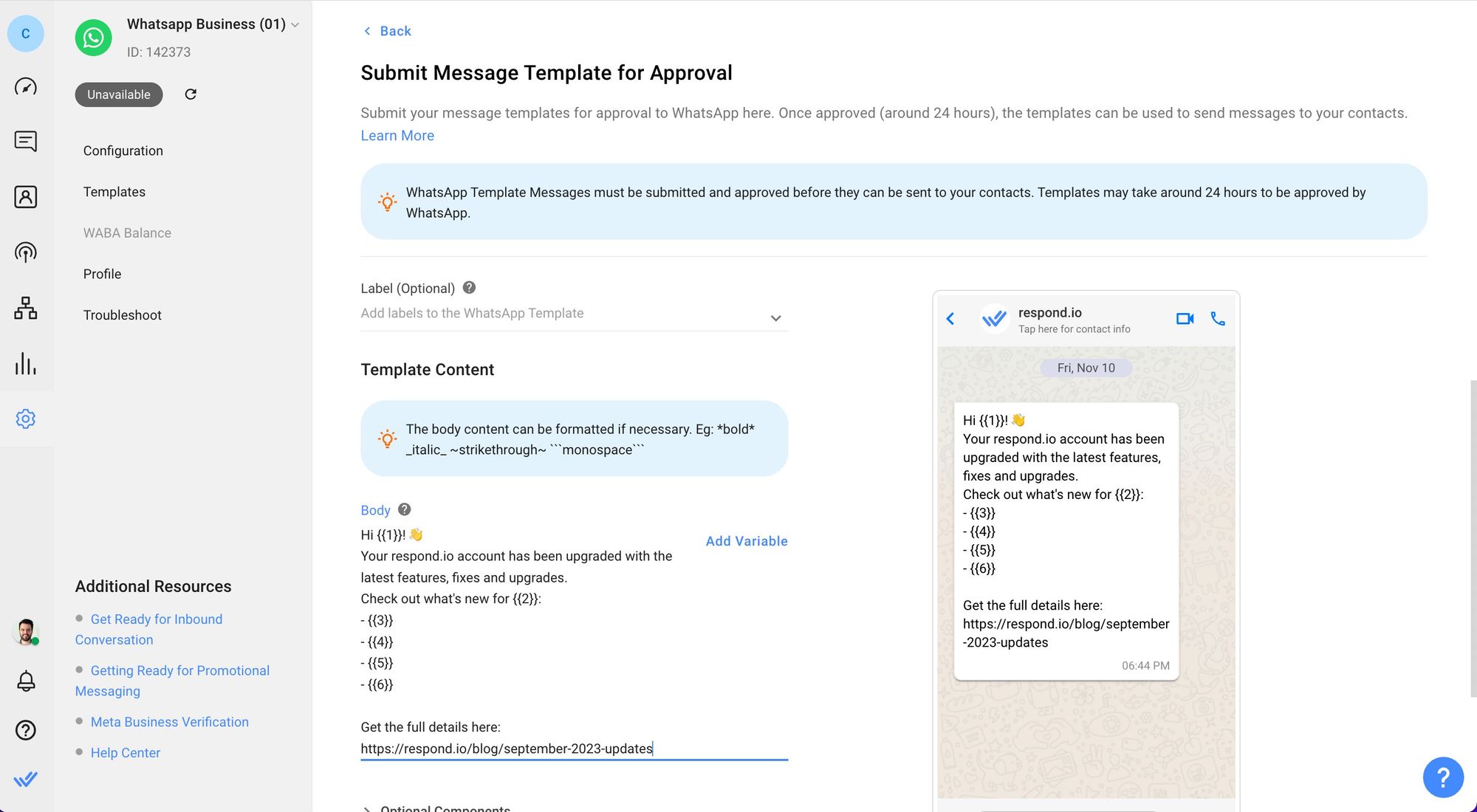
Pertimbangkan juga untuk menambahkan tombol ajakan bertindak atau tombol balas cepat untuk memungkinkan penerima mengambil tindakan tertentu langsung dari buletin Anda. Berikutnya, sertakan variabel dinamis yang akan menggantikan tempat penampung di buletin Anda untuk mempersonalisasinya dengan detail seperti nama pelanggan.
Setelah Anda'mengisi semua informasi yang dibutuhkan, klik tombol Kirim untuk mengirimkan templat Anda untuk disetujui. Setelah pengajuan, sangat penting untuk menyinkronkan template untuk memperbarui status mereka.
Setelah template pesan Anda disetujui, Anda dapat melanjutkan ke langkah terakhir: Mengatur siaran untuk mengirim buletin WhatsApp Anda kepada audiens yang tersegmentasi.
Navigasi ke Modul Siaran. Di sini Anda dapat mengelola dan membuat siaran Anda. Untuk membuat satu, klik tombol Siaran Baru. Ini akan membuka jendela baru di mana Anda dapat menyesuaikan siaran Anda.
Di jendela pembuatan siaran, masukkan nama siaran dan label, lalu klik Buat. Selanjutnya, Anda perlu menentukan audiens target untuk buletin WhatsApp Anda dengan Segmen Anda. Kemudian, pilih saluran API WhatsApp Anda dan template pesan yang telah Anda buat untuk buletin ini.
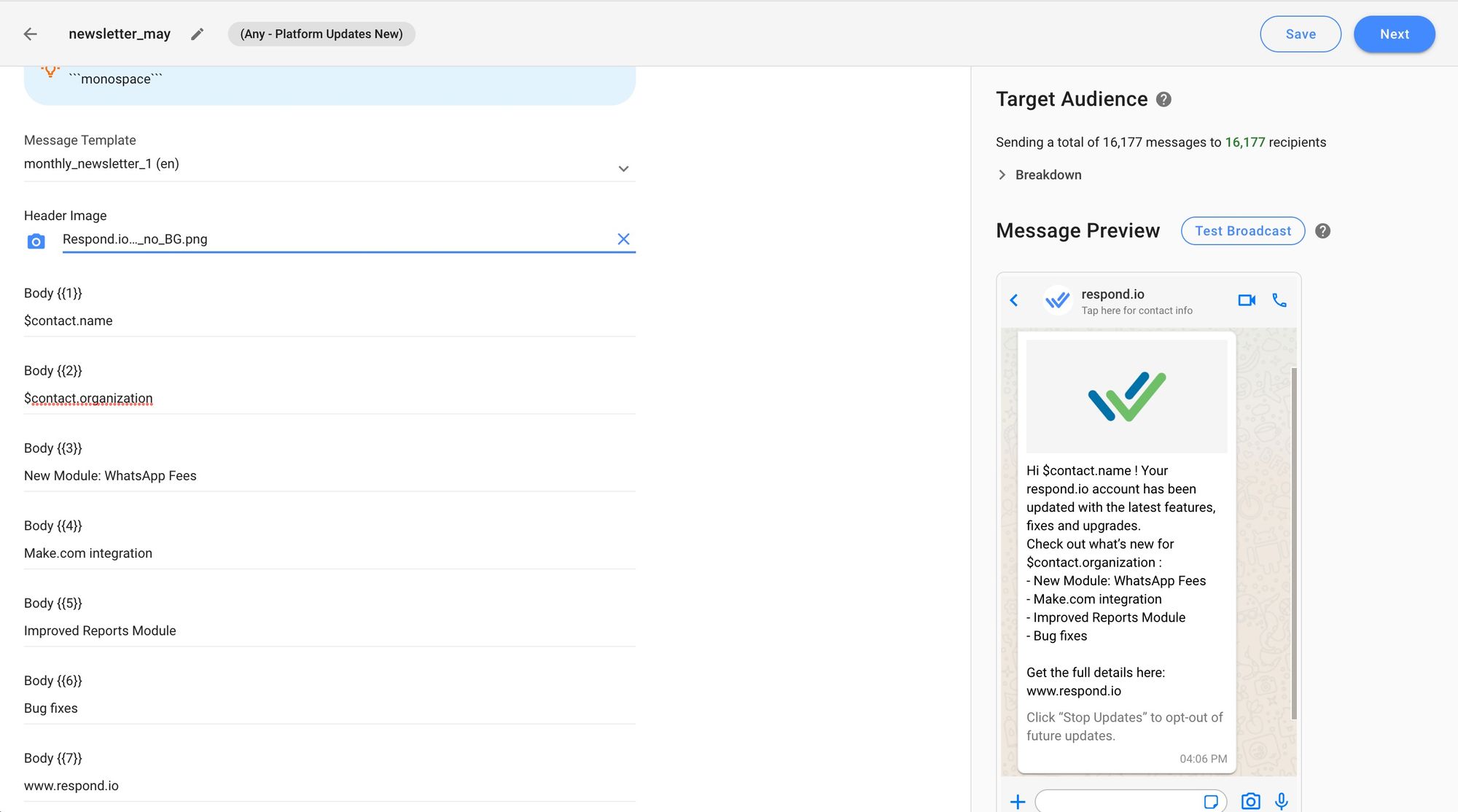
Pastikan buletin WhatsApp Anda hanya dikirimkan ke Kontak yang telah mengirimi Anda pesan sebelumnya. Ini adalah cara termudah untuk mematuhi kebijakan WhatsApp dan mencegah nomor Anda dilaporkan.
Harap dicatat bahwa Anda dapat menguji siaran Anda sebelum mengirimnya ke audiens dengan mengklik Uji Siaran. Jika Anda siap, klik Selanjutnya dan pilih waktu pengiriman dan tarif pengiriman Anda. Terakhir, klik Kirim Siaran dan selesai.
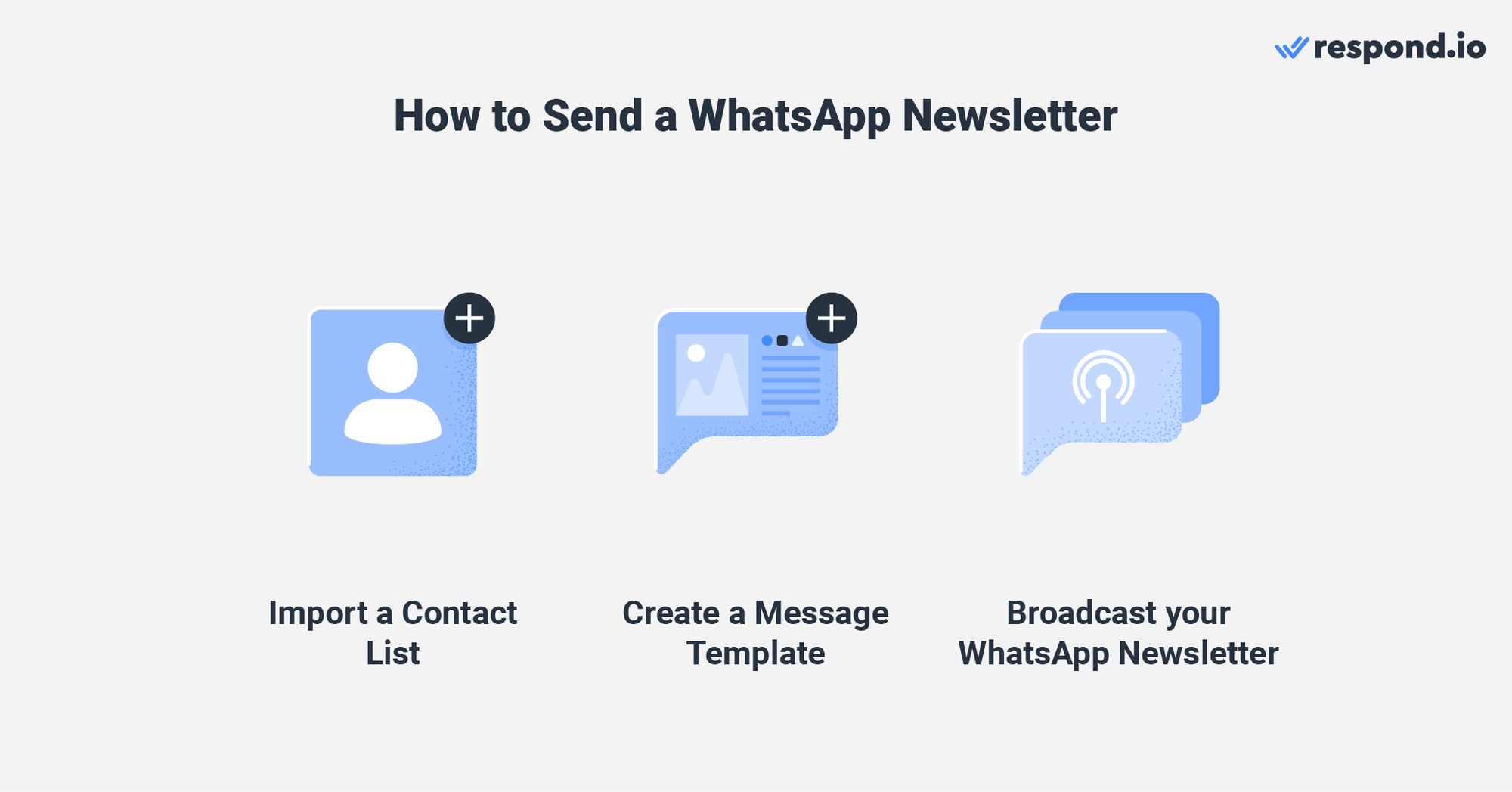
Salah satu keuntungan menggunakan respond.io sebagai alat newsletter WhatsApp adalah kemampuan untuk memantau kinerja newsletter melalui analitik siaran. Dalam Modul Laporan, kunjungi tab Siaran dan Pesan untuk mendapatkan wawasan tentang newsletter WhatsApp Anda.
Jika Anda ingin memulai dengan mudah dalam newsletter WhatsApp, tidak perlu mencaricari lebih jauh. Kami akan menyediakan beberapa template untuk berbagai kasus penggunaan.
Template newsletter WhatsApp ini dapat membantu Anda terlibat dengan pelanggan Anda dan menjaga mereka tetap terinformasi. Silakan sesuaikan sesuai dengan kebutuhan spesifik Anda dan preferensi audiens.
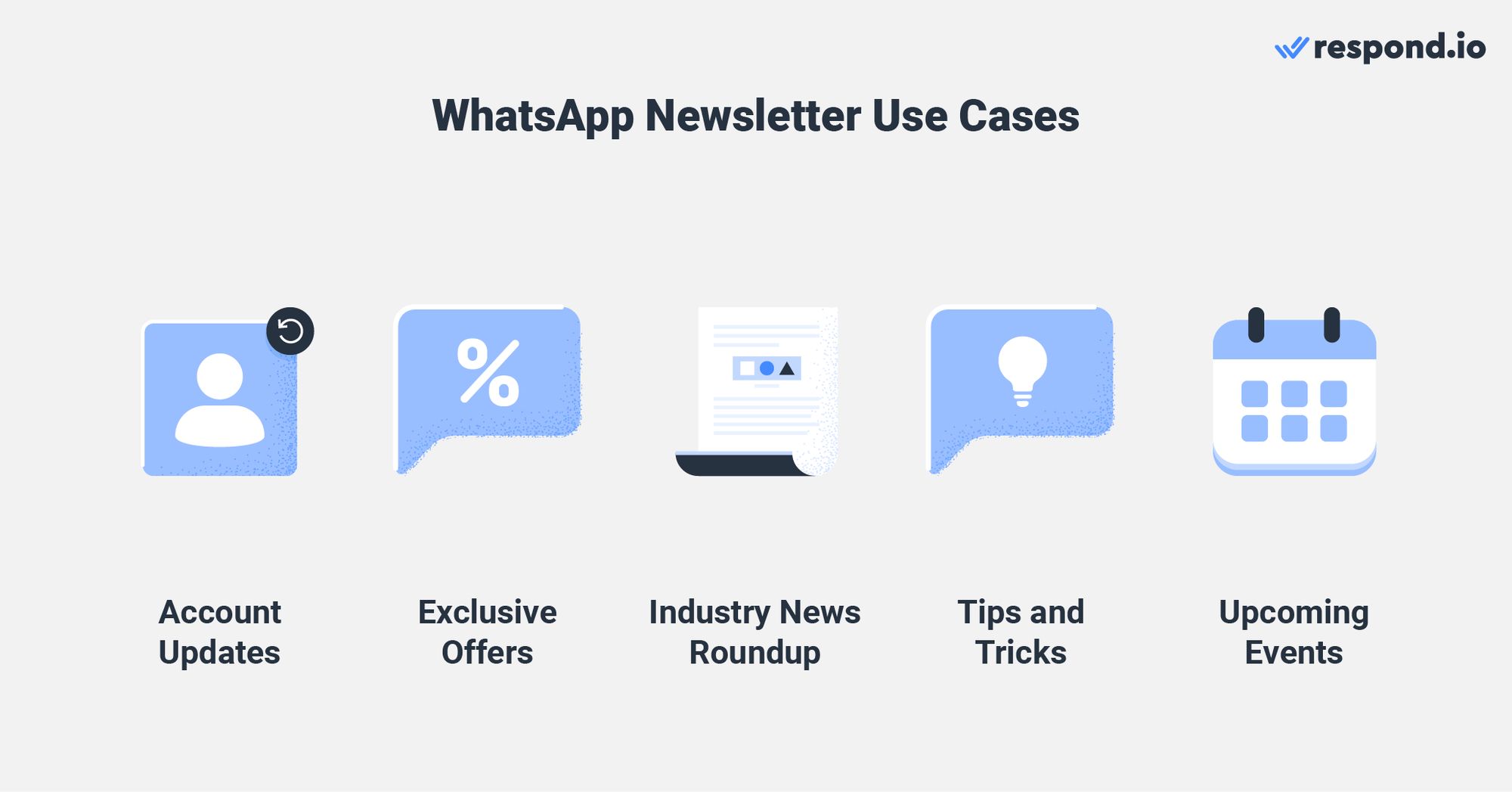
Ingatlah untuk menyertakan merek perusahaan dan informasi kontak Anda untuk sentuhan profesional.
Gunakan
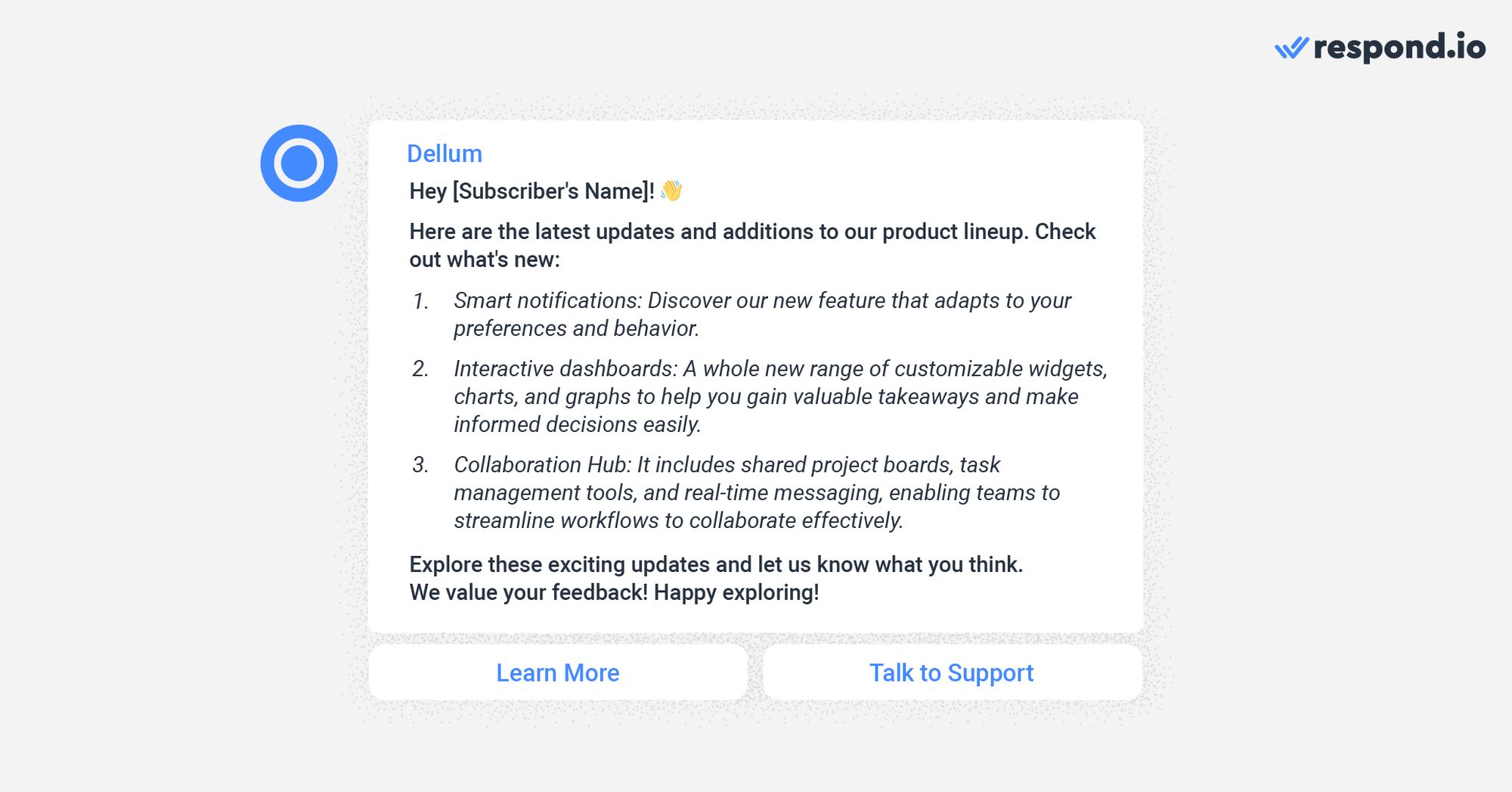
Sebagai contoh, Anda dapat memberi tahu mereka tentang peningkatan sistem, pembaruan kebijakan, atau langkah-langkah keamanan akun.
Berikan penawaran dan promosi eksklusif langsung ke kotak masuk WhatsApp pelanggan Anda. Anda dapat menciptakan rasa urgensi dan eksklusivitas dengan menawarkan penawaran waktu terbatas, diskon, atau keuntungan khusus.
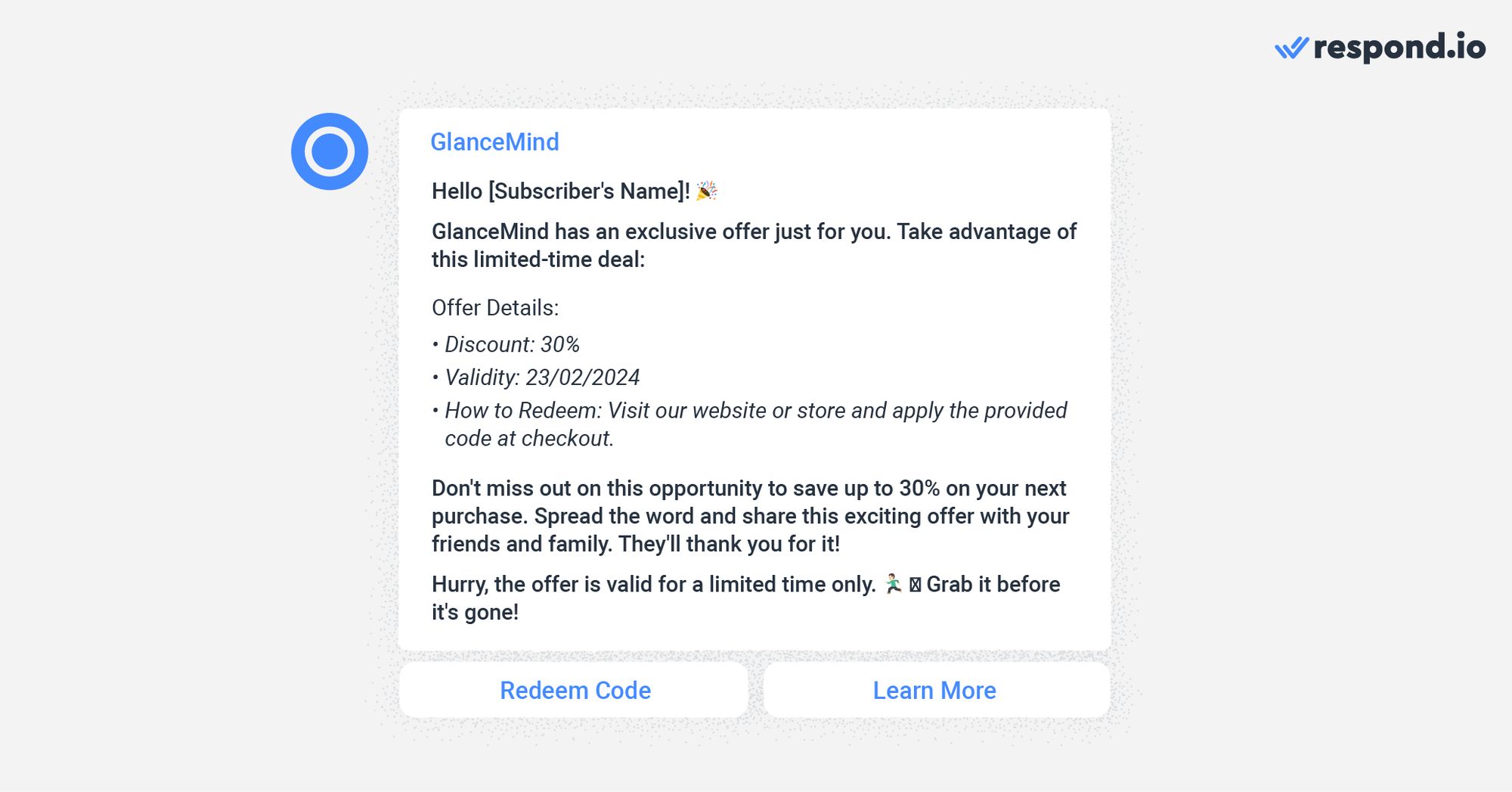
Menyebarkan buletin dengan penawaran yang tidak dapat ditolak membantu bisnis mendorong konversi dan meningkatkan loyalitas pelanggan. Untuk pendekatan yang lebih personal, pertimbangkan untuk menyesuaikan penawaran berdasarkan preferensi pelanggan atau riwayat pembelian.
Menjadi sumber yang terpercaya untuk berita dan tren industri bagi pelanggan Anda. Kompilasi peristiwa terbaru, wawasan, dan perkembangan di industri Anda dan bagikan melalui buletin yang ringkas dan informatif.
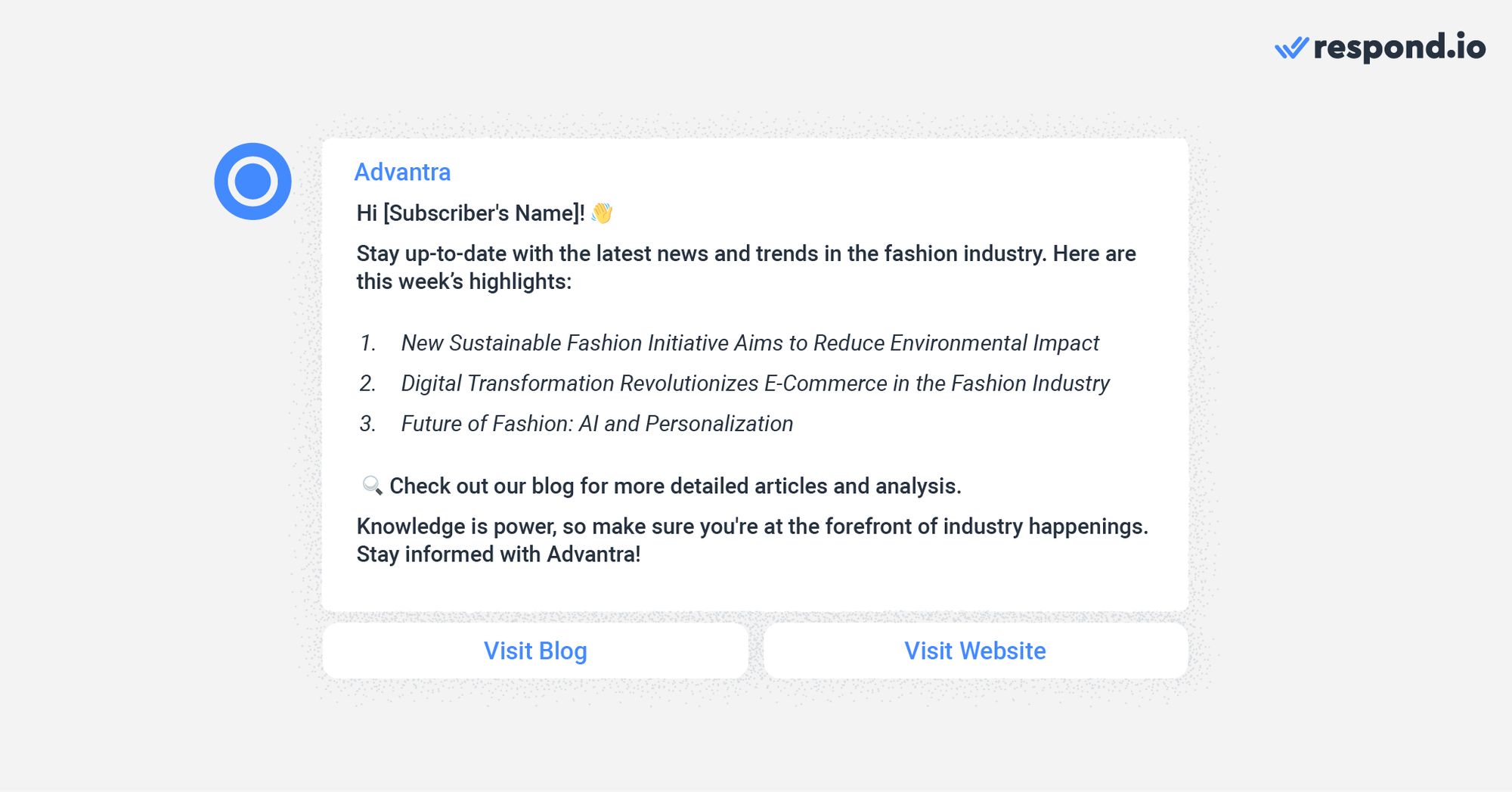
Posisikan merek Anda sebagai ahli industri dan tingkatkan keterlibatan dengan analisis, pendapat ahli, atau tips terkait berita untuk memberikan nilai tambahan.
Berikan tips, trik, dan solusi berharga terkait produk atau layanan Anda. Sebagai alternatif, bantu pelanggan Anda memaksimalkan penggunaan produk, menyelesaikan masalah umum, atau menemukan fitur baru.
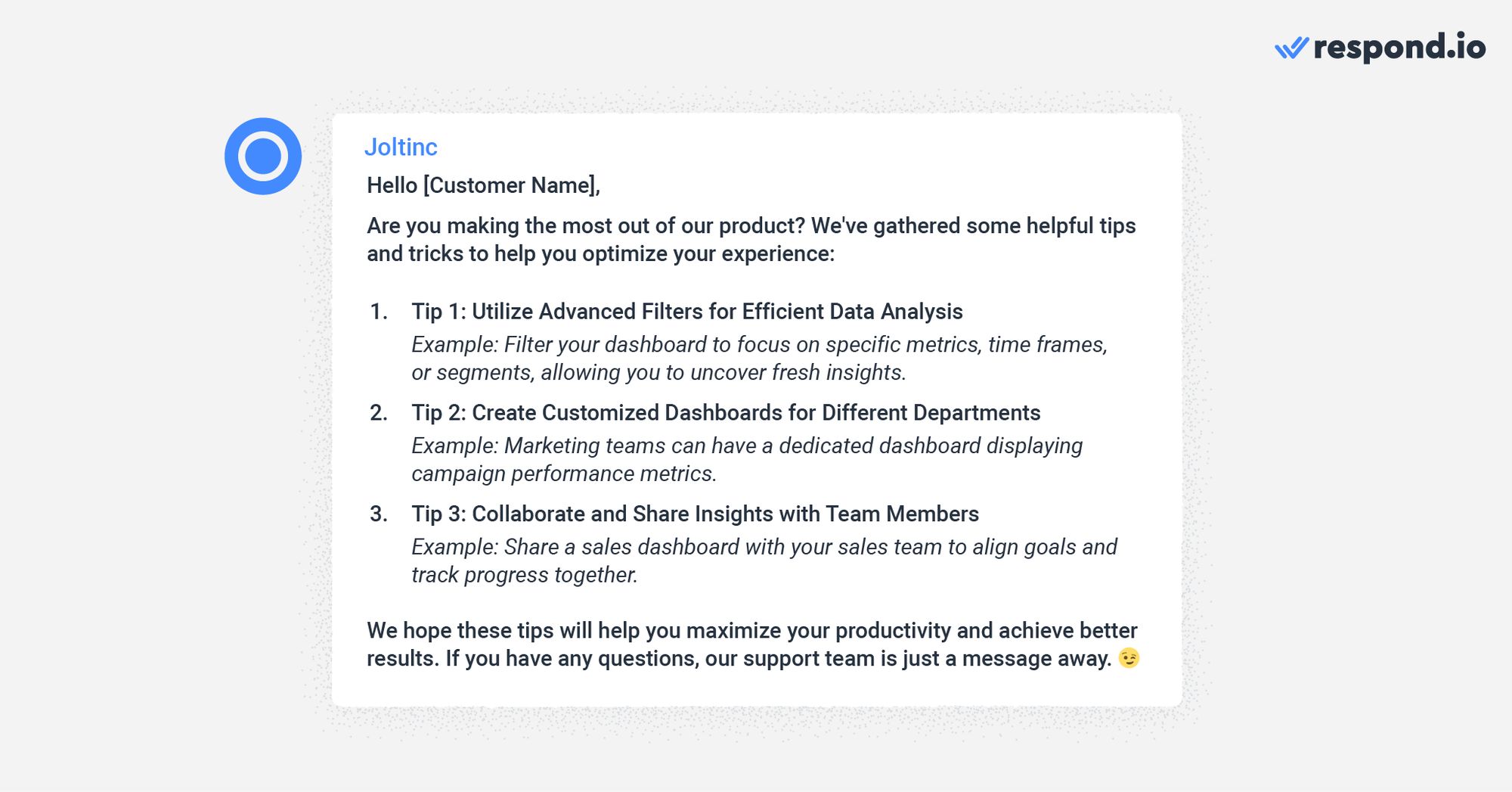
Jenis newsletter ini efektif dalam menjaga keterlibatan pelanggan dan meningkatkan pengalaman mereka secara keseluruhan dengan merek Anda.
Gunakan template newsletter ini untuk memberi tahu pelanggan Anda tentang acara yang akan datang, seperti konferensi, webinar, atau peluncuran produk. Berikan rincian acara, jadwal, dan informasi pendaftaran.
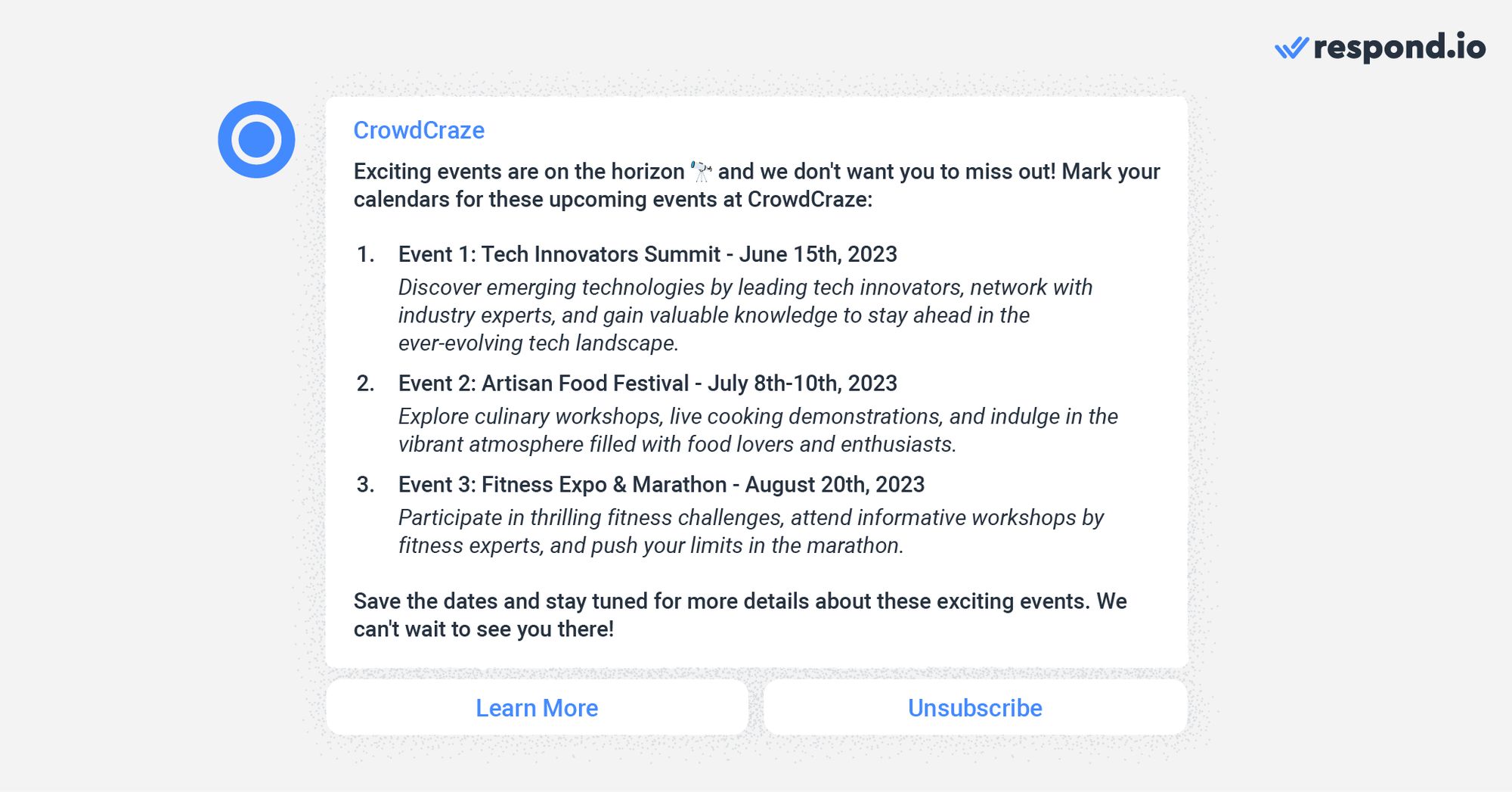
Untuk menciptakan antusiasme dan mendorong partisipasi untuk membangun rasa komunitas di sekitar merek Anda, soroti setiap pembicara tamu, sesi khusus, atau keuntungan eksklusif yang dapat diharapkan para peserta.
Sebagai kesimpulan, newsletter WhatsApp memberikan bisnis cara yang kuat untuk terlibat dengan audiens mereka dan menjaga mereka tetap terinformasi. Menggunakan alat newsletter WhatsApp yang canggih seperti respond.io memungkinkan bisnis untuk menyederhanakan pembuatan, pengiriman, dan analisis newsletter mereka.
Ini menghasilkan jangkauan audiens yang lebih luas, efisiensi komunikasi yang lebih baik, dan metrik keberhasilan yang dapat diukur.
Dengan mengikuti panduan ini dan memanfaatkan template newsletter WhatsApp yang diberikan, bisnis dapat menggunakan WhatsApp secara efektif sebagai platform untuk komunikasi dan pemasaran, membangun hubungan yang lebih kuat dengan audiens mereka. Selain itu, Anda bahkan dapat melihat balasan otomatis WhatsApp dan pesan terjadwal WhatsApp untuk mendapatkan manfaat lebih lanjut dari upaya newsletter Anda.
Anda telah mencapai akhir! Ini adalah semua yang perlu Anda ketahui untuk memulai dengan newsletter WhatsApp. Untuk memulai mengirim buletin WhatsApp kepada pelanggan Anda,cobalah respond.io secara gratis dan dapatkan akun API WhatsApp dalam hitungan menit.
Ubah percakapan menjadi pelanggan dengan API WhatsApp resmi respond.io. ✨
Kelola panggilan dan obrolan WhatsApp di satu tempat!
Ingin belajar tentang topik terkait WhatsApp API lainnya? Berikut adalah beberapa artikel untuk membantu Anda:
Román Filgueira, lulusan Universitas Vigo yang memegang gelar Sarjana Bahasa Asing, bergabung dengan tim respond.io sebagai Penulis Konten pada tahun 2021. Román menawarkan wawasan ahli tentang praktik terbaik untuk menggunakan aplikasi perpesanan guna mendorong pertumbuhan bisnis.

Bisnis tidak dapat mengirim pesan WhatsApp setelah 24 jam kecuali mereka menggunakan Templat Pesan WhatsApp. Pelajari cara memformat dan mengirim pesan templat beserta contohnya.